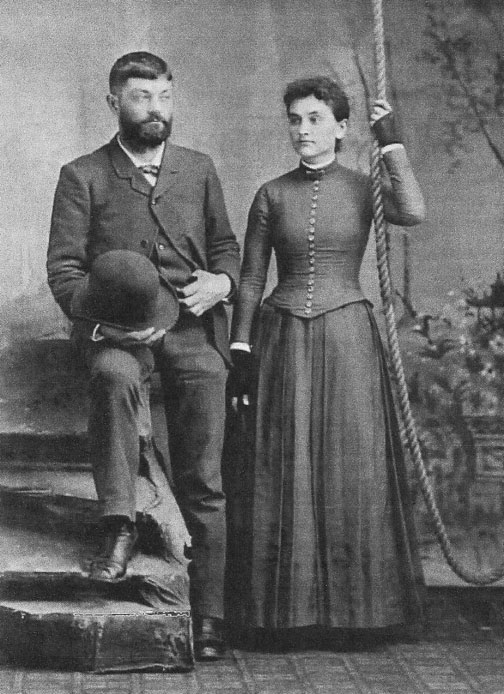|
Henry P Krehbiel (1862-1940) was a Mennonite pastor, inventor, historian, publisher, bookstore owner, world traveler, denominational leader, board member for two Mennonite colleges and served one term in the Kansas Legislature. He was also the owner, publisher and editor of the Mennonite Weekly Review.
Henry, also known as H. P., was born in Summerfield, Illinois to Christian and Susanna Ruth Krehbiel. When he turned 16 his parents sent him and his 18 year old brother John to scout out new land in Kansas. The brothers purchased land near Halstead, Kansas and within four years established a wheat farm, built a large house and welcomed their parents and eleven siblings to Kansas. H.P. was not content with farming so at age twenty and without a day in high school, entered Kansas Normal School for Teachers. A year later, a Quaker school quickly hired him as a teacher and he aided his father in the Mennonite Church in Halstead and also with a new school he started: the Halstead Seminary for training preachers, missionaries and Sunday school teachers. He also aided his brothers in organizing a bookstore called the Beehive and, next to it, a hardware store. In his spare time, he invented a continuous sickle for harvesting wheat, which many claimed was more efficient than the McCormick Reaper and, for the seminary library, an apparatus for archiving newspapers. With the encouragement of his family, H.P. enrolled in Oberlin College where 1895 he earned a degree in theology. After completing his degree, the Mennonite Church in Canton, Ohio hired him as their pastor and he was also appointed to the board of directors of Bluffton College. In order to support this new education venture, he began a weekly newspaper Mennonite Review which was also published in German as the Post und Volksblatt. In 1898 he moved back to Kansas with his wife Matilda Kruse and daughter Elva Agnes. There he expanded the family bookstore and renamed it the Herald Book and Publishing Company. His responsibilities with the denomination increased greatly during the early 1900s. He changed the name of the publication to the Mennonite Weekly Review and the German edition was called Der Herald. He served as chair, secretary or treasurer for many committees such as the Western District Mennonite Conference, Mennonite Immigration Bureau, Mennonite Settlers Society and the Bethel College Board of Directors Special Committee for Reorganization. During World War I he chaired a delegation that spent a month in Washington, DC petitioning congressmen, senators and even the Secretary of War on the problems facing conscientious objectors. H.P.s resolve was not dimmed and he set on a nationwide tour of prison camps where Mennonites were confined. He reported his findings to the Secretary of War who then ceased the brutality toward many conscience objectors. It was during that “war to end all wars” that his printing press and bookstore were doused in yellow paint. He quietly cleaned up the mess and continued to publish. After the war, he changed the name of his publication to Mennonite Weekly Review and the German edition to Der Herald. In order to expand his own knowledge of Mennonites, he and his wife visited churches across the United States, Eastern Canada, Europe, the Middle East and India. All along the way he recruited correspondents who would send monthly reports on Mennonite activities in their area. He developed a deep respect for great diversity among Mennonites. Mennonites, he believed, could work together if they followed this dictum: “In essentials unity, in non-essentials liberty.” The essentials for him were pacifism, baptism, education, missions and service for peace. Throughout his long life, he was an advocate for stronger biblical studies programs at our Mennonite colleges or even the possibility of a special school to train pastors and missionaries. The religious controversies of the day, in particular the conservative/modernist crises, also drew his attention. Krehbiel’s position was clear: we should be cautious about both movements. While conservatives claimed to follow the bible, they overlook Jesus’s teachings on peace and pacifism. Although modernists examined biblical history, they also gloss over Jesus’s teachings on peace and pacifism. This issue, nonresistance and pacifism would emerge as his main line of thought. He wrote a number of books and pamphlets but his final one was War, Peace and Amity which outlines his biblical pacifism and a confident vision for contemporary world peace. In 1931, he delivered a speech entitled “What is Pacifism?” at peace conference sponsored by Quakers, Mennonites and Church of the Brethren. Surely the Lord would say of H. P. Krehbiel, well done thou good and faithful servant. Sources:
|
DownloadThe Living Mirror: Archaeology of Our Faith
Archives
December 2018
|
||||||
|
* = login required
|
Visit425 S. Central Park Blvd.
Chicago, IL 60624 |
Contact |


 RSS Feed
RSS Feed
